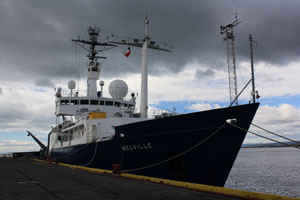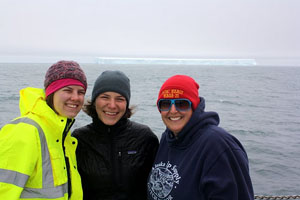|
|
Blogging and BLOS: The Great Belt Research Cruise
02/08/2011
| Medea Steinman,
(Ocean Systems)
|
 The R/V Melville at dock in Punta Arenas, Chile (Photo by R. Fowler) |
You can follow the expedition from the Great Belt Research Cruise education and outreach website and the cruise blog. Rebecca Fowler, Director of Education at BLOS, has joined the cruise and has been giving us a peek into the science, the scientists, the ship, and data collected on the cruise. There’s also a map tracking the route of the Melville from the southern tip of Chile to South Africa. The site offers information about ocean science careers through interviews with two undergraduate interns, a marine chemist and a PhD researcher. That researcher, by the way, is Dr. Ben Twining who recently presented a COSEE-OS ROLE Model webinar about his studies of melting icebergs.
 Rebecca Fowler (center) and two colleagues on the deck of the R/V Melville (Photo by R. Fowler) |
COSEE-OS and Bigelow Laboratory for Ocean Sciences
Since COSEE-OS began in 2005, a number of scientists from Bigelow Laboratory for Ocean Sciences (BLOS) have worked with us in education and outreach efforts. They have participated in COSEE-OS workshops and webinars, and now, in our second phase of work, Bigelow is continuing this partnership. Please join us for our next ROLE Model Webinar Series, which will feature Dr. Rick Wahle (formerly of Bigelow, and now based at UMaine’s Darling Marine Center) and Dr. David Fields of Bigelow Lab.
|

